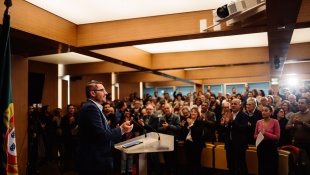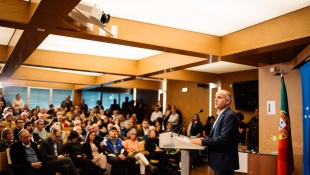The conclusions of the European Council are marked, once again, by the shameful absence of any reference to the dramatic situation in Palestine due to Israel's brutal aggression. An option that reveals the cynicism and hypocrisy of those who, on other occasions, are loquacious in proclamations and condemnations about violations of international law, human rights and democracy. A position that reflects effective and undisguised complicity with the heinous crimes, massacres and atrocities committed by Israel against the Palestinian people.
The European Council meeting adopted, as expected, the mid-term review of the Multiannual Financial Framework (MFF) 2021-2027 of the European Union (EU).
This review, involving a total amount of 64.6 billion euros, is determined not by the need to respond to the real problems of each country and each people, but rather by interests that are alien to and contradictory to this need.
In fact, the conclusions of the European Council show once again that in the EU there is always more and more money for war, but not to solve the problems that workers and populations face.
The allocation, until 2027 of 50 billion euros to the now called “Mechanism for Ukraine” – of which 33 billion euros in loans and 17 billion euros in non-repayable grants – reflects the European Union's insistence on prolonging the war and confrontation and rejection of the opening of negotiation channels aimed at achieving peace.
To the 50 billion euros now decided, there may also be added the result from the reinforcement of the cynically called “European Peace Support Mechanism”, an instrument that aims to continue fuelling the war. In this regard, it is symptomatic that the European Council has reiterated the acceleration of deliveries of more weapons, considering that “they will contribute to increasing the production capacity of European industry”. A confession about whose interests the insistence on the policy of instigating and prolonging war, with all its dramatic and grave consequences for the people, truly serves.
The 2021-2027 MFF, being the EU's multiannual budget, largely determines its action priorities and portrays its major political options. The decisions now taken by the European Council go in the opposite direction to what would be necessary. They do not solve, but rather contribute to worsening existing problems and difficulties. Instead of decisions that enhance the militaristic drift and the dynamics of divergence within the EU, between countries and within each country, it is necessary to stop and reverse this path. It is necessary to have a EU budget that, taking into account different national economic and social realities, contributes, among other aspects, to: improving living conditions and fighting social inequalities and injustices; the increase in productive investment, prioritizing countries with persistent productive deficits; the improvement and modernisation of public services; the defence of nature, the fight against climate change and the sustainable use of natural resources; the reduction of territorial asymmetries; the promotion of peace and cooperation.
It should also be noted that on a smaller scale, the mid-term review of the 2021-2027 MFF also aims to reinforce:
- “Border management” (with 2 billion euros) and “externalisation of borders” (with 7.6 billion euros), intensifying a policy that is selective, repressive and inhumane towards migrants, which subverts principles of international law on asylum, which pays third countries to stop and contain migratory movements and which ignores the causes of migration – consolidating a migration and asylum policy also defended by the extreme right;
- The “European Defence Fund” (with 1.5 billion euros), enhancing the militarist drift that absorbs increasingly more resources, which are lacking in other areas; a drift that mainly takes advantage of the industrial-military complex of the main European powers, the same ones that will be the main beneficiaries of the Strategic Technologies for Europe Platform (STEP), for which more favourable financing conditions are now created than those foreseen for the structural and cohesion funds;
- The “flexibility” and “special” instruments (totalling 3.5 billion euros), including those aimed at dealing with unforeseen situations, which were currently exhausted, particularly due to their mobilisation to reinforce items related to militarism and war.
Unacceptably, to face the impact of rising interest rates on the payment of debt contracted to constitute the Recovery and Resilience Facility, the adoption of a “cascade mechanism” is confirmed, which provides for the recourse to reallocation of funds of future budgets, initially foreseen for other areas, to pay interest on the debt contracted. Furthermore, it is certain that the review now carried out involves cutting funds, among others, in areas such as: cooperation and development aid; the Framework for Research Programme (“Horizon Europe”); the European Globalisation Adjustment Fund; the management of the Common Agricultural Policy and cohesion funds; and the “EU4Health” programme.


